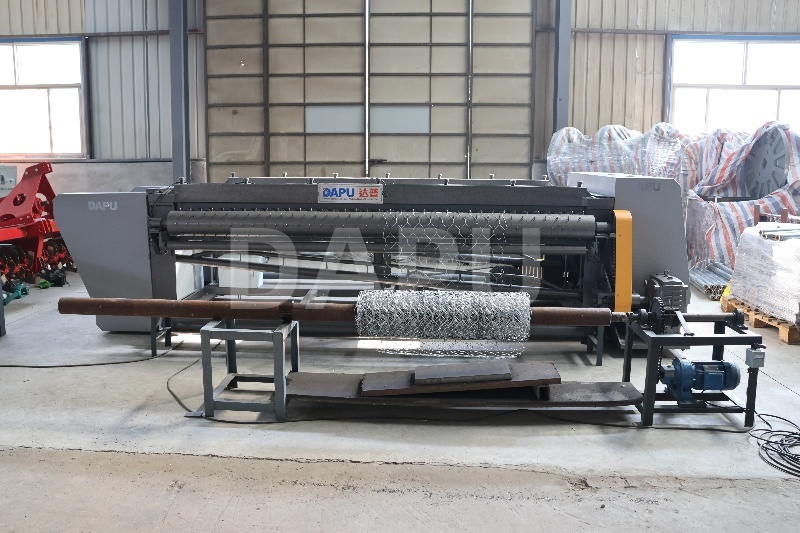
How to Choose the Right Hexagonal Wire Mesh Machine for Your Business
Category:News
Author:
Source:
Add time:2025-06-11 14:27
Choosing the right hexagonal wire mesh machine is a critical investment decision for businesses involved in gabion basket production, poultry fencing, erosion control, or other wire mesh applications. The wrong machine can lead to production bottlenecks, high operating costs, unreliable output, and ultimately, lost profits. For businesses operating in dynamic regions like South America, the Middle East, Southeast Asia, and Africa, where specific challenges abound, making an informed choice is even more crucial. This guide breaks down the key factors you must consider to select the machine that perfectly aligns with your business needs and market demands.

Step 1: Define Your Core Production Requirements
Before diving into machine specs, get crystal clear on what you need to produce:
Primary Mesh Applications:
Gabions: Primarily require larger mesh sizes (2" / 50mm and 3" / 75mm/80mm are standard) and thicker wires (often 2.0mm - 2.2mm or even higher for heavy-duty applications). Durability and strength are paramount.
Poultry Netting: Requires smaller mesh sizes (1/2" / 15mm, 3/4" / 20mm, 1" / 25mm/28mm) and lighter wires (typically 0.4mm - 1.6mm). Consistent mesh opening and coating integrity are key for animal safety.
Other Applications (Erosion Control, Fencing, Reinforcement): Vary widely. Identify the exact mesh sizes and wire gauges your market demands.
Target Mesh Sizes & Wire Diameters: Be specific. Which exact sizes do your customers buy most? What wire thicknesses (diameter) are needed for the required strength in your applications? Machines have specific ranges (e.g., Wire: 0.4mm - 2.2mm; Mesh: 1/2" to 3"). Ensure your target products fall comfortably within the machine's capabilities. Crucially: Most machines are configured for ONE specific mesh size at a time.
Required Mesh Width: What roll widths do your customers need? Common options include 2600mm, 3000mm, 3300mm, 4000mm, 4300mm, and 4700mm. Choose a machine that offers the widths you require.
Daily/Weekly Production Volume: Estimate your current and projected near-future output needs (in linear meters or square meters). This directly impacts the required machine speed and capability.
Step 2: Evaluate Machine Capabilities Against Your Needs
Now, match your requirements to the technical specifications and features of potential machines:
Mesh Size & Wire Diameter Compatibility:
Must-Have: Verify the machine can handle the exact mesh sizes and wire diameter range you defined in Step 1. Don't assume.
Example: The DAPU DP-CSR handles wires from 0.4mm to 2.2mm and produces key sizes like 1/2", 3/4", 1", 2", and 3". Perfect for both poultry and gabion producers.
Production Speed & Efficiency - The Game Changer:
Look Beyond Single Speed: Speed ratings (e.g., 95-100 M/hour for 1" mesh) are usually given per roll. The real efficiency leap comes from machines that can weave multiple rolls simultaneously.
Why Multi-Roll Matters (Especially for Volume): A machine weaving 4 rolls of 1" mesh at 100 M/hour each produces 400 linear meters per hour total. A single-roll machine only produces 100 M/hour. For high-volume needs (large infrastructure projects, big poultry farms), multi-roll capability (like the DP-CSR's 2-4 rolls) drastically reduces production time, labor cost per meter, and time-to-market, offering a vastly superior Return on Investment (ROI).
Calculate Real Output: Always multiply the stated speed per roll by the maximum number of rolls the machine can produce concurrently. Compare this total hourly output between machines.
Material Versatility & Local Sourcing:
Problem in Emerging Markets: Consistent access to specific high-grade wires or coatings can be difficult or expensive.
Solution: Choose a machine proven to work reliably with the types of wire commonly available in your region. Can it handle both standard galvanized wire and various PVC-coated wires? Machines like the DP-CSR, specifying both Galvanized and PVC-coated wire compatibility, offer crucial flexibility, allowing you to source cost-effectively locally.
Machine Robustness & Reliability:
Critical for Challenging Environments: Dust, humidity, heat, sand, and unstable power supplies (common in Africa, the Middle East, parts of SEA & South America) can cripple poorly built machines.
Look For: Heavy-duty construction, quality components, effective sealing (where possible), and a reputation for reliability under continuous operation. Simpler mechanical designs can sometimes offer advantages in harsh conditions if maintenance is easier. The DP-CSR's dedicated motor system (Thorn: 2.3kW, Dislocation: 2.3kW, Board: 2.3kW, Brace: 4.4kW) provides targeted power and inherent robustness.
Ease of Operation & Maintenance:
Problem: Finding highly skilled technicians in remote areas is hard and costly. Complex machines mean longer downtimes.
Need: Intuitive controls, accessible components for routine lubrication and adjustments, clear manuals, and good training materials. Inquire about the availability of local technical support or training from the supplier/manufacturer. Simplicity reduces operational headaches.
Power Consumption & Operating Costs:
Calculate Running Costs: Higher energy prices make efficient motors important. Look at the total motor kW rating (e.g., DP-CSR totals 11.3kW) and factor this into your cost-per-meter calculations. Machines that produce more meters per hour (especially multi-roll) naturally spread the energy cost thinner.
Minimize Waste: Efficient machines minimize wire breakage and scrap.
Footprint & Installation:
Ensure you have adequate space in your workshop for the machine, including room for wire spools, the produced mesh rolls, and safe operator access. Consider power supply requirements (voltage, phase).
Step 3: Consider Total Cost of Ownership (TCO) & ROI
The purchase price is just the beginning. Truly evaluate the investment:
Initial Purchase Price: Get quotes.
Installation & Commissioning: Factor in any costs for setup, foundation work, or initial training.
Operating Costs: Energy consumption (calculate based on kW rating and expected running hours), raw material utilization efficiency.
Maintenance & Spare Parts: What is the expected maintenance schedule? Are spare parts readily available locally or through the supplier? What are their costs? Reliability reduces long-term maintenance costs.
Potential Revenue & ROI:
The Multi-Roll Multiplier: This is where machines like the DAPU DP-CSR shine. Calculate the potential revenue generated based on the total output (speed per roll x number of rolls). A machine producing 400 meters/hour can generate significantly more revenue than one producing 100 meters/hour, justifying a potentially higher initial investment much faster.
Market Demand: Factor in your selling price and the strength of demand in your region. High-volume capabilities allow you to bid on and win larger contracts.
Step 4: Supplier Reputation & Support
Your relationship with the supplier is vital, especially in regions where local support might be limited:
Experience & Reputation: How long have they been making these machines? What is their track record, particularly in your geographic region or similar markets? Look for testimonials or ask for references.
Technical Support: What level of after-sales support do they offer? Is there phone/email support? Do they have local agents or technicians? How quickly can they respond to issues?
Spare Parts Availability: Are spare parts stocked locally or regionally? What is the typical lead time for parts? Reliable access to parts minimizes costly downtime.
Training: Do they provide comprehensive machine operation and maintenance training? Is it on-site or at their facility?
Warranty: Understand the terms and duration of the warranty.
Case Study: Why the DAPU DP-CSR Fits Emerging Market Needs
Consider how a machine like the DAPU DP-CSR addresses the core selection criteria for businesses in South America, the Middle East, Southeast Asia, and Africa:
Meeting Production Needs: Handles critical gabion (2", 3") and poultry (1/2", 3/4", 1") sizes with wire (0.4-2.2mm) for both.
Unmatched Efficiency: Its 2-4 roll simultaneous production capability delivers potentially 2-4x the output of comparable single-roll machines, maximizing ROI – essential for competitive markets and large projects.
Material Flexibility: Works with locally prevalent Galvanized and PVC-coated wires.
Built for Tough Conditions: Robust construction and dedicated motor system enhance reliability in demanding environments.
Growing Support: DAPU focuses on expanding its presence and support in these target regions.
Conclusion: Invest in Intelligence, Not Just Iron
Choosing the right hexagonal wire mesh machine requires careful analysis beyond the price tag. It demands a deep understanding of your specific production requirements, market demands, and operational environment. Prioritize machines that offer the necessary technical capabilities (especially crucial mesh sizes and wire range), exceptional efficiency (where multi-roll production is a massive advantage), material flexibility for local sourcing, proven reliability for your conditions, and manageable operational complexity.
For businesses aiming to thrive in the growing markets of South America, the Middle East, Southeast Asia, and Africa, a machine that excels in these areas – like the DAPU DP-CSR with its transformative multi-roll output – isn't just an expense; it's a strategic investment in productivity, profitability, and long-term competitiveness. By following this structured selection process, you can confidently choose the machine that will become a reliable engine for your business growth.
Recommend News




